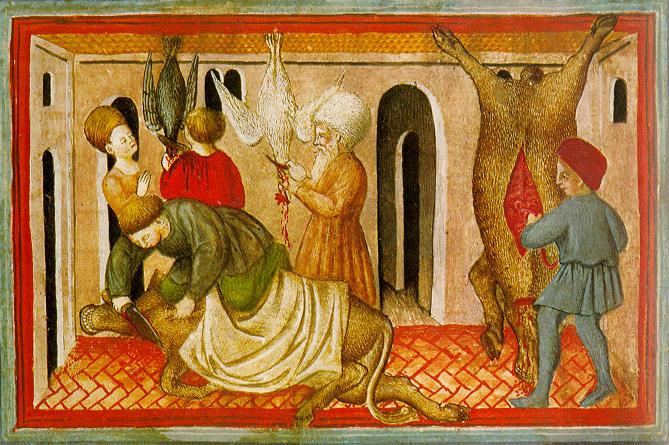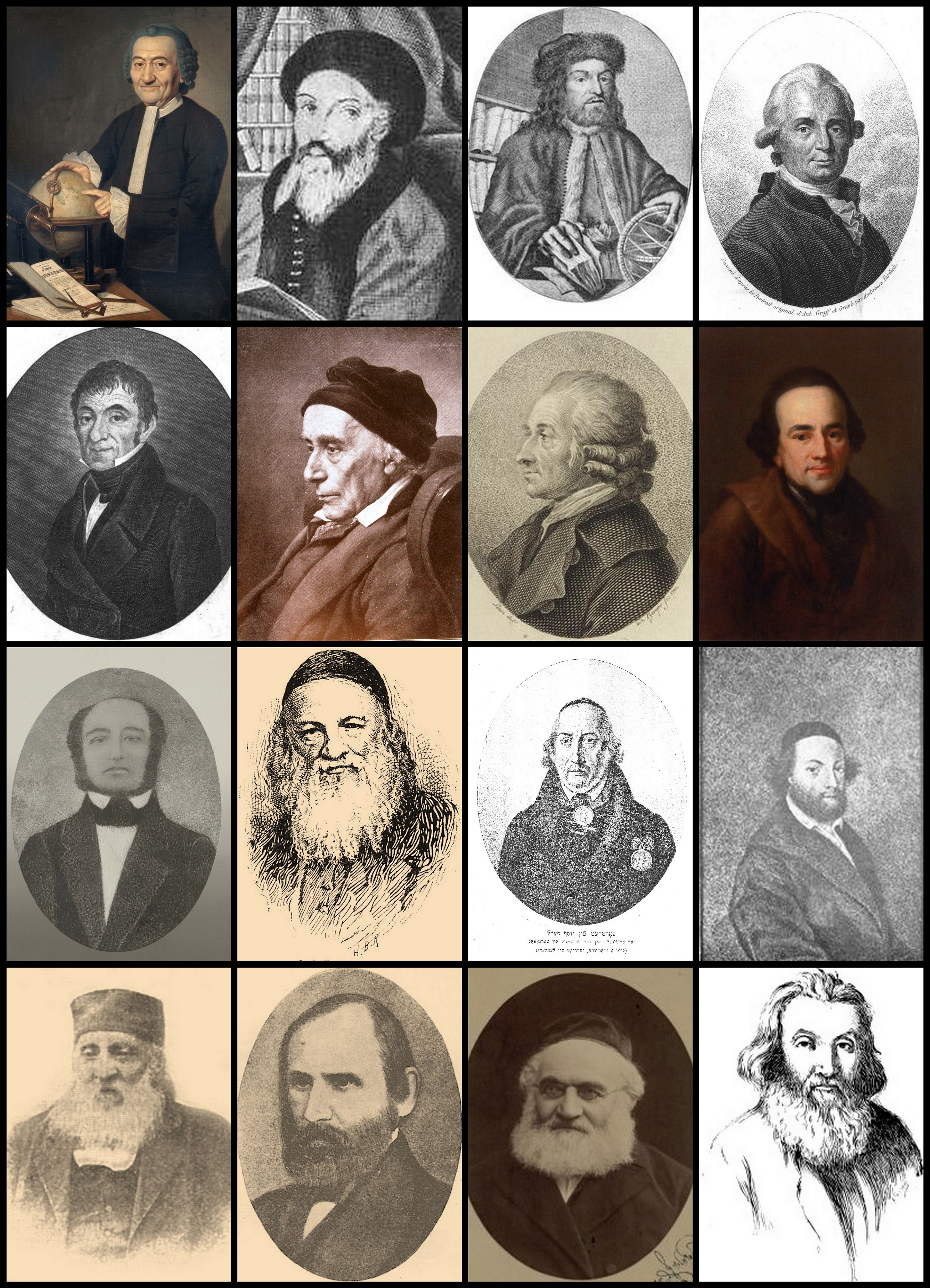|
Cheder
A ''cheder'' (, lit. 'room'; Yiddish pronunciation: ''khéyder'') is a traditional primary school teaching the basics of Judaism and the Hebrew language. History ''Cheders'' were widely found in Europe before the end of the 18th century. Lessons took place in the house of the teacher, known as a '' melamed'', whose wages were paid by the Jewish community or a group of parents. Normally, only boys would attend classes - girls were educated by their mothers in their homes. Where money was scarce and the community could not afford to maintain many teachers, boys of all ages would be taught in a single group. Although traditionally boys start learning the Hebrew alphabet the day they turned three, boys typically entered ''cheder'' school around the age of 5. After learning to read Hebrew, they would immediately begin studying the Torah, starting with the Book of Leviticus. They would usually start learning the Mishnah at around seven years of age and the Talmud (Mishnah, Gemara ... [...More Info...] [...Related Items...] OR: [Wikipedia] [Google] [Baidu] |
Jewish Orthodoxy
Orthodox Judaism is a collective term for the traditionalist branches of contemporary Judaism. Theologically, it is chiefly defined by regarding the Torah, both Torah, Written and Oral Torah, Oral, as literally revelation, revealed by God in Judaism, God on Mount Sinai (Bible), Mount Sinai and faithfully transmitted ever since. Orthodox Judaism therefore advocates a strict observance of Jewish Law, or ''halakha'', which is to be Posek, interpreted and determined only according to traditional methods and in adherence to the continuum of received precedent through the ages. It regards the entire ''halakhic'' system as ultimately grounded in immutable revelation, essentially beyond external and historical influence. More than any theoretical issue, obeying the Kosher, dietary, Tumah and taharah, purity, ethical and other laws of ''halakha'' is the hallmark of Orthodoxy. Practicing members are easily distinguishable by their lifestyle, refraining from doing 39 Melakhot, numerous rou ... [...More Info...] [...Related Items...] OR: [Wikipedia] [Google] [Baidu] |
Yeshiva
A yeshiva (; ; pl. , or ) is a traditional Jewish educational institution focused on the study of Rabbinic literature, primarily the Talmud and halacha (Jewish law), while Torah and Jewish philosophy are studied in parallel. The studying is usually done through daily '' shiurim'' (lectures or classes) as well as in study pairs called '' chavrusas'' ( Aramaic for 'friendship' or 'companionship'). '' Chavrusa''-style learning is one of the unique features of the yeshiva. In the United States and Israel, different levels of yeshiva education have different names. In the U.S., elementary-school students enroll in a '' cheder'', post- bar mitzvah-age students learn in a '' mesivta'', and undergraduate-level students learn in a '' beit midrash'' or '' yeshiva gedola'' (). In Israel, elementary-school students enroll in a Talmud Torah or '' cheder'', post-bar mitzvah-age students learn in a ''yeshiva ketana'' (), and high-school-age students learn in a ''yeshiva gedola''. ... [...More Info...] [...Related Items...] OR: [Wikipedia] [Google] [Baidu] |
Melamed
Melamed, ''Melammed'' ( "teacher") in Biblical times denoted a religious teacher or instructor in general (e.g., in Psalm 119:99 and Proverbs 5:13), but which in the Talmudic period was applied especially to a teacher of children, and was almost invariably followed by the word ''tinokot'' ( "children"). The Aramaic equivalent was . The melamed was appointed by the community, and there were special regulations determining how many children he might teach, as well as rules governing the choice of applicants for the office and the dismissal of a melamed. These regulations were extended and augmented in the post-Talmudic period. Regulations Besides the teachers appointed by the community, there were others who were privately engaged by the parents of children; hence it became necessary to define accurately the mutual rights and duties of the melamed and of the parents. While giving instruction, the melamed was not allowed to do any other work. If he was ill, and therefore unable to t ... [...More Info...] [...Related Items...] OR: [Wikipedia] [Google] [Baidu] |
Germanophone
German (, ) is a West Germanic language in the Indo-European language family, mainly spoken in Western Europe, Western and Central Europe. It is the majority and Official language, official (or co-official) language in Germany, Austria, Switzerland, and Liechtenstein. It is also an official language of Luxembourg, German-speaking Community of Belgium, Belgium and the Italian autonomous province of South Tyrol, as well as a recognized national language in Namibia. There are also notable German-speaking communities in other parts of Europe, including: Poland (Upper Silesia), the Czech Republic (North Bohemia), Denmark (South Jutland County, North Schleswig), Slovakia (Krahule), Germans of Romania, Romania, Hungary (Sopron), and France (European Collectivity of Alsace, Alsace). Overseas, sizeable communities of German-speakers are found in the Americas. German is one of the global language system, major languages of the world, with nearly 80 million native speakers and over 130 mi ... [...More Info...] [...Related Items...] OR: [Wikipedia] [Google] [Baidu] |
Reform Judaism
Reform Judaism, also known as Liberal Judaism or Progressive Judaism, is a major Jewish religious movements, Jewish denomination that emphasizes the evolving nature of Judaism, the superiority of its Jewish ethics, ethical aspects to its ceremonial ones, and belief in a continuous revelation which is closely intertwined with human reason and not limited to the Theophany at Mount Sinai (Bible), Mount Sinai. A highly Religious liberalism, liberal strand of Judaism, it is characterized by little stress on ritual and personal observance, regarding Jewish law as non-binding and the individual Jew as autonomous, and by a great openness to external influences and Progressivism, progressive values. The origins of Reform Judaism lie in German Confederation, mid-19th-century Germany, where Rabbi Abraham Geiger and his associates formulated its early principles, attempting to harmonize Jewish tradition with modern sensibilities in the age of Jewish emancipation, emancipation. Brought to Am ... [...More Info...] [...Related Items...] OR: [Wikipedia] [Google] [Baidu] |
Shechita
In Judaism, ''shechita'' (anglicized: ; ; ; also transliterated ''shehitah, shechitah, shehita'') is ritual slaughtering of certain mammals and birds for food according to ''kashrut''. One who practices this, a kosher butcher is called a ''shochet''. Biblical sources Deuteronomy 12:21 states that sheep and cattle should be slaughtered "as I have instructed you", but nowhere in the Torah are any of the practices of ''shechita'' described. Instead, they have been handed down in Rabbinic Judaism's Oral Torah, and codified in ''halakha''. Species The animal must be of a permitted species. For mammals, this is restricted to ruminants which have split hooves. For birds, although biblically any species of bird not specifically excluded in Deuteronomy 14:12–18 would be permitted, doubts as to the identity and scope of the species on the biblical list led to rabbinical law permitting only birds with a tradition of being permissible. Fish do not require kosher slaughter to be ... [...More Info...] [...Related Items...] OR: [Wikipedia] [Google] [Baidu] |
Age Of Enlightenment
The Age of Enlightenment (also the Age of Reason and the Enlightenment) was a Europe, European Intellect, intellectual and Philosophy, philosophical movement active from the late 17th to early 19th century. Chiefly valuing knowledge gained through rationalism and empiricism, the Enlightenment was concerned with a wide range of social and Politics, political ideals such as natural law, liberty, and progress, toleration and fraternity (philosophy), fraternity, constitutional government, and the formal separation of church and state. The Enlightenment was preceded by and overlapped the Scientific Revolution, which included the work of Johannes Kepler, Galileo Galilei, Francis Bacon, Pierre Gassendi, Christiaan Huygens and Isaac Newton, among others, as well as the philosophy of Descartes, Hobbes, Spinoza, Leibniz, and John Locke. The dating of the period of the beginning of the Enlightenment can be attributed to the publication of René Descartes' ''Discourse on the Method'' in 1 ... [...More Info...] [...Related Items...] OR: [Wikipedia] [Google] [Baidu] |
Haskala
The ''Haskalah'' (; literally, "wisdom", "erudition" or "education"), often termed the Jewish Enlightenment, was an intellectual movement among the Jews of Central and Eastern Europe, with a certain influence on those in Western Europe and the Muslim world. It arose as a defined ideological worldview during the 1770s, and its last stage ended around 1881, with the rise of Jewish nationalism. The movement advocated against Jewish reclusiveness, encouraged the adoption of prevalent attire over traditional dress, while also working to diminish the authority of traditional community institutions such as rabbinic courts and boards of elders. It pursued a set of projects of cultural and moral renewal, including a revival of Hebrew for use in secular life, which resulted in an increase in Hebrew found in print. Concurrently, it strove for an optimal integration in surrounding societies. Practitioners promoted the study of exogenous culture, style, and vernacular, and the adoption ... [...More Info...] [...Related Items...] OR: [Wikipedia] [Google] [Baidu] |
Crusades
The Crusades were a series of religious wars initiated, supported, and at times directed by the Papacy during the Middle Ages. The most prominent of these were the campaigns to the Holy Land aimed at reclaiming Jerusalem and its surrounding territories from Muslim rule. Beginning with the First Crusade, which culminated in the Siege of Jerusalem (1099), capture of Jerusalem in 1099, these expeditions spanned centuries and became a central aspect of European political, religious, and military history. In 1095, after a Byzantine request for aid,Helen J. Nicholson, ''The Crusades'', (Greenwood Publishing, 2004), 6. Pope Urban II proclaimed the first expedition at the Council of Clermont. He encouraged military support for List of Byzantine emperors, Byzantine emperor Alexios I Komnenos, AlexiosI Komnenos and called for an armed pilgrimage to Jerusalem. Across all social strata in Western Europe, there was an enthusiastic response. Participants came from all over Europe and had a ... [...More Info...] [...Related Items...] OR: [Wikipedia] [Google] [Baidu] |
Pogrom
A pogrom is a violent riot incited with the aim of Massacre, massacring or expelling an ethnic or religious group, particularly Jews. The term entered the English language from Russian to describe late 19th- and early 20th-century Anti-Jewish pogroms in the Russian Empire, attacks on Jews in the Russian Empire (mostly within the Pale of Settlement). Retrospectively, similar attacks against Jews which occurred in other times and places were renamed pogroms. Sometimes the word is used to describe publicly sanctioned purgative attacks against non-Jewish groups. The characteristics of a pogrom vary widely, depending on the specific incident, at times leading to, or culminating in, massacres. Significant pogroms in the Russian Empire included the Odessa pogroms, Warsaw pogrom (1881), Kishinev pogrom (1903), Kiev pogrom (1905), and Białystok pogrom (1906). After the collapse of the Russian Empire in 1917, several pogroms occurred amidst the power struggles in Eastern Europe, inclu ... [...More Info...] [...Related Items...] OR: [Wikipedia] [Google] [Baidu] |






